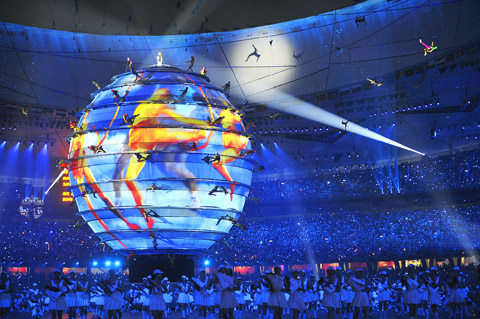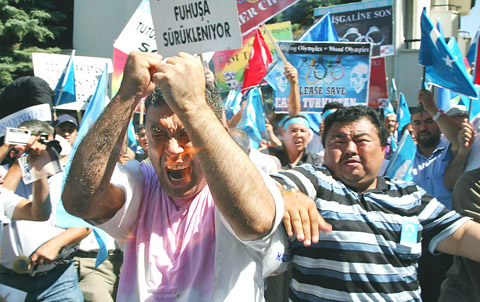AGENCIES, BEIJING
Resurgent China opened the Olympics yesterday with a burst of fireworks at a spectacular ceremony that celebrated ancient Chinese history and aimed to draw a line under months of political controversy.
An army of 2,008 drummers pounded out the countdown to the Games, which mark China’s emergence from impoverished isolation to economic might, but have also galvanized critics of the Communist government’s human rights record.

PHOTO: AFP
Approximately 80 world leaders, including US President George W. Bush, joined 91,000 excited spectators in the majestic Bird’s Nest stadium for the opening show. The global television audience was expected to exceed 1 billion viewers.
Firecrackers rippled around the rim of the arena, thousands of red, green and blue strobe lights flickered in the auditorium and a forest of drumsticks turned a luminous red, flashing bright in the hazy, humid air.
“Friends have come from afar, how happy we are,” the drummers chanted before a series giant fireworks were set off, blasting across the heart of the Chinese capital and crossing Tiananmen Square as they progressed to the Bird’s Nest.

PHOTO: AFP
The authorities opened Tiananmen Square, scene of a violently repressed student uprising in 1989, ahead of the ceremony to let people watch the fireworks, prompting thousands of delighted Beijing residents to rush into the vast esplanade screaming “Go China!”
Yesterday’s ceremony caps seven years of work that reshaped Beijing and sets the seal on an industrial boom that has boosted China’s international standing.
UNRESTAX
However, the Olympic spotlight has also cast a harsh glare on the nation of 1.3 billion people, bringing the unrest in its Tibetan region to the forefront and showing that the Communist leadership is not ready to brook any internal dissent.
A force of 100,000 police fanned out to prevent attacks and protests, while dissidents have been kept out of sight.
But early foreign activists issued an on-air challenge to the host city early in the day with a pirate radio broadcast, calling for the freeing of political prisoners and lifting of censorship.
Though Bush said he was coming for sport not politics and despite criticism by China for meddling in its internal affairs, he used the dedication of a new US embassy in Beijing earlier yesterday to drive home his point that freedom of speech was the best way to promote prosperity and peace.
“We continue to be candid about our belief that all people should have the freedom to say what they think and worship as they choose,” he said.
“We strongly believe societies which allow the free expression of ideas tend to be the most prosperous and the most peaceful,” Bush said a few hours before a lunch hosted by Chinese President Hu Jintao (胡錦濤) for foreign leaders.
UN Secretary-General Ban Ki-moon issued a video appeal at the ceremony calling on warring nations to honor a traditional truce during the Games. “I call on all those engaged in hostilities to respect it.”
PROTESTS
Thousands of people in Asia and Europe also took part in human rights protests against Beijing yesterday. Demonstrators took to the streets of cities including London, Brussels, Berlin, Kathmandu, Bangkok and Hong Kong on issues ranging from the crackdown in Tibet to Beijing’s support for the military junta in Myanmar.
In Ankara, a man doused himself with gasoline and set himself alight during a protest outside the Chinese embassy in the Turkish capital.
An Associated Press photographer says the man was taking part in a demonstration by Uighurs outside the embassy to coincide with the opening ceremony of the Olympic Games.
Police and other demonstrators rushed to extinguish the flames.
The man was taken to hospital and there was no immediate news on his condition.
In New Delhi, nearly 3,000 Tibetans shouting anti-China slogans braved heavy rains to protest near India’s parliament against the Olympics being staged by China.
Several hundred human rights activists rallied outside the Chinese embassy in Paris yesterday after a court overturned a police ban on demonstrations.
Marching behind a banner depicting the five Olympic rings as handcuffs, about 200 supporters of media watchdog Reporters Without Borders walked from Champs-Elysees to the Chinese embassy. They were joined by 200 to 300 human rights activists and pro-Tibetan demonstrators who had staged a separate rally near the Eiffel Tower, carrying five coffins and banners calling for “Freedom for Tibet.”
A small group of Uighur Muslims also joined in the rally, along with a handful of demonstrators from Myanmar.
In London, about 300 protesters gathered opposite the Chinese embassy, many of them Tibetan exiles wearing red headbands bearing one word: “Killed.”
And in Brussels, around 200 Tibetan protesters, some chained together or wearing “bloody” bandages, protested near the headquarters of EU institutions.
PATRIOTISM
Meanwhile, thousands of Chinese waving national flags thronged main Beijing streets yesterday, greeting the opening of the Olympic Games with a huge outpouring of national pride.
While the opening ceremony in the main Bird’s Nest stadium may have been all about world harmony, the message on the streets was about patriotism, with the Chinese flag much more in evidence than those with the Olympic logo.
“We want to show the world the real China, because a lot of people don’t understand our country and try to demonise it,” said Wan Qian, 23, with red “I love China” stickers plastered on her face and T-shirt, watching the ceremony on an outdoor screen.
Many people wore T-shirts emblazoned with logos in Chinese or English, some reading “Listen to China’s voice” and “I love China now more than ever.”
Also See: BEIJING 2008

SECURITY: As China is ‘reshaping’ Hong Kong’s population, Taiwan must raise the eligibility threshold for applications from Hong Kongers, Chiu Chui-cheng said When Hong Kong and Macau citizens apply for residency in Taiwan, it would be under a new category that includes a “national security observation period,” Mainland Affairs Council (MAC) Minister Chiu Chui-cheng (邱垂正) said yesterday. President William Lai (賴清德) on March 13 announced 17 strategies to counter China’s aggression toward Taiwan, including incorporating national security considerations into the review process for residency applications from Hong Kong and Macau citizens. The situation in Hong Kong is constantly changing, Chiu said to media yesterday on the sidelines of the Taipei Technology Run hosted by the Taipei Neihu Technology Park Development Association. With

CARROT AND STICK: While unrelenting in its military threats, China attracted nearly 40,000 Taiwanese to over 400 business events last year Nearly 40,000 Taiwanese last year joined industry events in China, such as conferences and trade fairs, supported by the Chinese government, a study showed yesterday, as Beijing ramps up a charm offensive toward Taipei alongside military pressure. China has long taken a carrot-and-stick approach to Taiwan, threatening it with the prospect of military action while reaching out to those it believes are amenable to Beijing’s point of view. Taiwanese security officials are wary of what they see as Beijing’s influence campaigns to sway public opinion after Taipei and Beijing gradually resumed travel links halted by the COVID-19 pandemic, but the scale of

TRADE: A mandatory declaration of origin for manufactured goods bound for the US is to take effect on May 7 to block China from exploiting Taiwan’s trade channels All products manufactured in Taiwan and exported to the US must include a signed declaration of origin starting on May 7, the Bureau of Foreign Trade announced yesterday. US President Donald Trump on April 2 imposed a 32 percent tariff on imports from Taiwan, but one week later announced a 90-day pause on its implementation. However, a universal 10 percent tariff was immediately applied to most imports from around the world. On April 12, the Trump administration further exempted computers, smartphones and semiconductors from the new tariffs. In response, President William Lai’s (賴清德) administration has introduced a series of countermeasures to support affected

Pope Francis is be laid to rest on Saturday after lying in state for three days in St Peter’s Basilica, where the faithful are expected to flock to pay their respects to history’s first Latin American pontiff. The cardinals met yesterday in the Vatican’s synod hall to chart the next steps before a conclave begins to choose Francis’ successor, as condolences poured in from around the world. According to current norms, the conclave must begin between May 5 and 10. The cardinals set the funeral for Saturday at 10am in St Peter’s Square, to be celebrated by the dean of the College